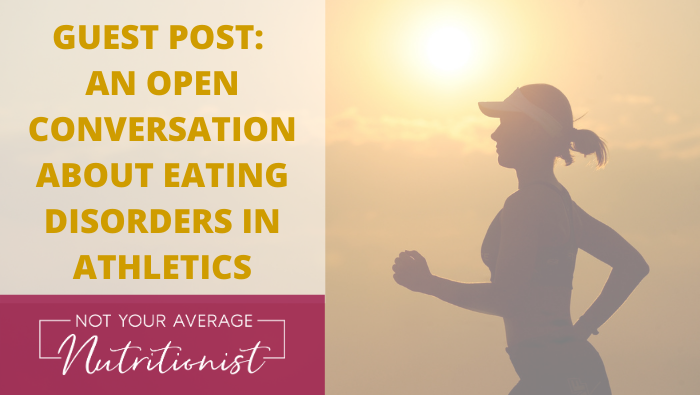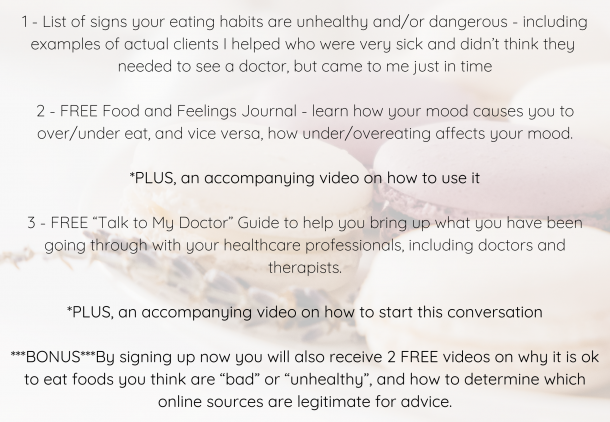by Jessica Cushing-Murray
Mental health and issues like eating disorders (EDs) are being talked about more and more on platforms like social media. More people are speaking out about its importance and why these topics need to be addressed and brought up in conversation. And these are all great things – it’s exciting to see people spreading awareness with public social media posts – but posting about it and having a real life face-to-face conversation with someone struggling with an eating disorder are two very different tasks.
On my Division I college athletics team, issues like EDs were known but not necessarily voiced. Everyone knew the risk factors, the warning signs, and the importance of a well-balanced diet, but we didn’t have very many honest conversations about these things as a team. You can be someone who posts on Facebook that you support the education of athletes on the dangers of eating disorders, but you don’t really understand what that means until someone on your team (who you run with and see every single day) becomes so thin that the doctors bench her because they believe that continuing to race would be hazardous to her health.
So what does an open, in-person conversation about eating disorders look like? And why is it so important to have them, especially within the athletic community? The conversation starts with either a troubled person reaching out for help, or with a person concerned about a friend/family member.
Because the stigmatization of issues like eating disorders, or potential to be pulled from the team, athletes are often less inclined to talk about it or reach out for help than a non-athlete. However, in my experience, the most significant occurrence is the chain reaction that starts when one person speaks up about their struggles with eating, exercising, or dieting. All it takes is one brave person to tell a teammate that he/she is having a hard time, and we as athletes hear someone else admitting vulnerability, and are suddenly less afraid to acknowledge our own struggles. These conversations are so instrumental within athletics because we have very strong feelings about avoiding signs of weakness.
My team experienced this in a truly positive way. By one girl confessing something as small as “it makes me nervous to eat a lot of carbs,” it opens up the discussion into eating issues, and we realized that a lot of us were having the same fears and feelings when it came to nutrition. Talking about our own food beliefs with each other helped us realize that we weren’t alone in our thinking and that there are other people who know exactly what we are feeling. Once the conversation is opened up, everyone on the team is able to pitch in helpful ideas.
For some reason, in athletics, we find it harder to discuss mental issues in comparison to physical ones. But the conversation would actually follow the same outline regardless of whether someone is struggling with eating or dealing with a broken bone. For example, say you stress-fracture your tibia (shin bone). In distance running, odds are someone else on your team has had the same injury. They’re going to give you all the advice they can on non-weight-bearing forms of exercise, how important it was to wear the protective boot, and the best/worst days that came along as a result of their injury.
Discussions on issues like EDs would go exactly the same way. Because some people have never experienced food fears or the need to exercise or restrict calories, these people can give insight into their healthy way of thinking that keeps them on the right path to a well-nourished body. Some people have experienced these problems before and have guidance on the tools that can be used to overcome these fears. Others on the team are currently struggling, and the team atmosphere and accountability enables them to go places like the on-campus counseling services to seek advice from professionals. The best part about having other people know is that this difficult step of getting help can be done together and with friends.
So I ask again, why is opening up this conversation so important? Because seeking help and getting well is a process that is held up by a support system of people who want your recovery just as much as you do. There is so much to be gained by not having to go through an eating disorder alone. Talking about our mental struggles and fears and looking for support from the people around us is beneficial for ourselves and can unknowingly be the life-changing difference for others.
If you’ve noticed someone close to you showing signs of an ED, first try to understand that what they are going through is very difficult. Then, see if they’re ready to be open up about it; because talking about it is the first step toward getting help. And when it comes to asking someone about it, realize there are so many different possible outcomes: you can be supportive, have lots of questions, or you may even be wrong about them having an ED, but the worst thing you can do is to ignore it. So, ask. Be the person who’s willing to have a conversation about it. Be the difference.


